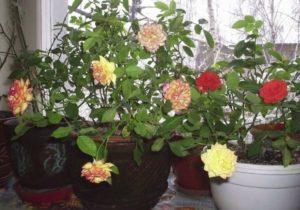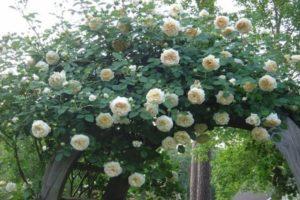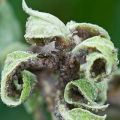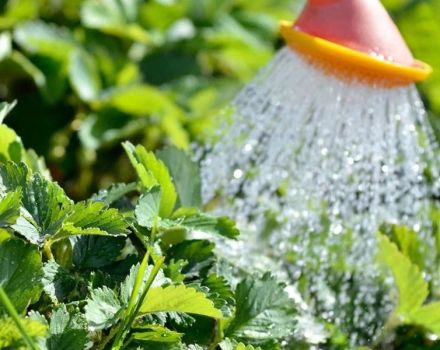How to treat roses from aphids, how to deal with drugs and folk remedies
From the beginning of May and throughout the summer, the life of flower growers complicates the appearance of pests on plants. How to treat roses when aphids appear, and how to prevent re-infection - this question is becoming the most popular question for flower owners. Before starting the fight, it is necessary to understand the causes of the appearance of the pest, as well as the features of its effect on the plant.
Causes of aphids on roses
The aphid is a small insect, the size of which does not exceed 2 millimeters. It feeds on plant sap, piercing the surface of shoots and leaves with a special proboscis. The scientific name for aphids is green rosanna. Getting rid of this pest is not difficult. There are a wide variety of chemicals. At home, flower growers often eliminate aphids on roses using folk remedies.
Basically, the causes of infection of a rose bush are the same factors that provoke the development of other diseases. These include:
- Incorrect care. With improper pruning and rare weeding, bushes are more susceptible to pests.
- Excess nitrogen in the soil. With an excessive concentration of nitrogen fertilizers, plant tissues become soft and lose density. It is these shoots that are most suitable for aphids.
- Ignoring preventive measures. You can reduce the risk of infection with preventive spraying.
Also, the frequency of planting affects the resistance of a rose to aphids. Planting bushes too close increases the risk of pest spread.
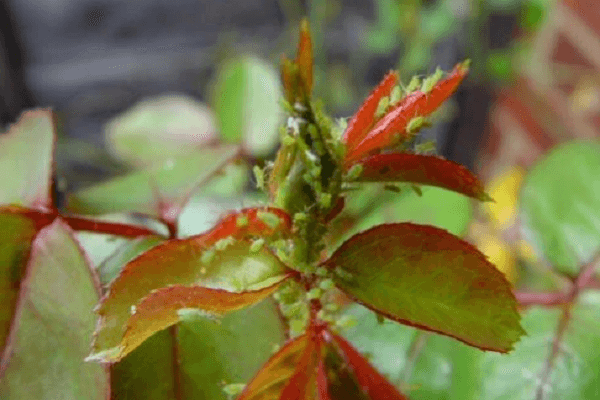
The cause of a rose infestation may be another plant that has been exposed to aphids. Ants are the carrier of the pest to a healthy plant. They feed on the dark sticky substance that roseanas secrete. Therefore, they are happy to increase the area of their distribution.
Infection of indoor roses is possible in the following cases:
- the appearance of an infected plant in the neighborhood;
- the introduction of aphids into the house by ants;
- introducing a pest on a person's clothing and footwear.
Interesting! Insects are amazingly fertile. One female is capable of giving birth to several thousand cubs. Their number increases every day and affects new bushes.
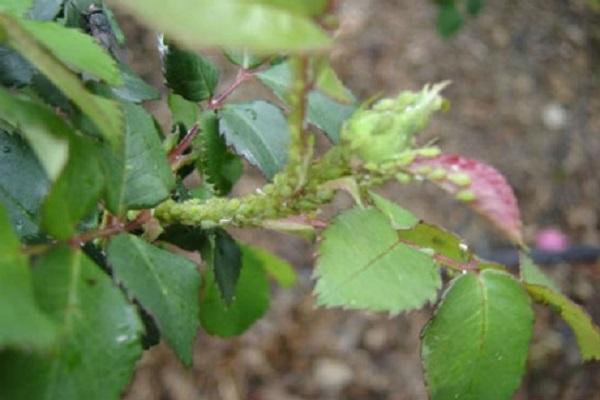
Symptoms of parasite infestation
Aphids prefer to localize on young plants. Since the basis of insect nutrition is juice, and it is more difficult to get it from old shoots, aphids infect the leaves and buds of young roses.
The first sign of flower infestation is the activation of ants.If their number on a plant has increased significantly, this may indicate the presence of a substance released by pests on the stems.
Other symptoms of rose infestation by aphids include:
- folding and yellowing of leaves;
- deformation of buds and tops of shoots;
- the presence of a liquid shiny plaque on the leaves and stem;
- falling buds.
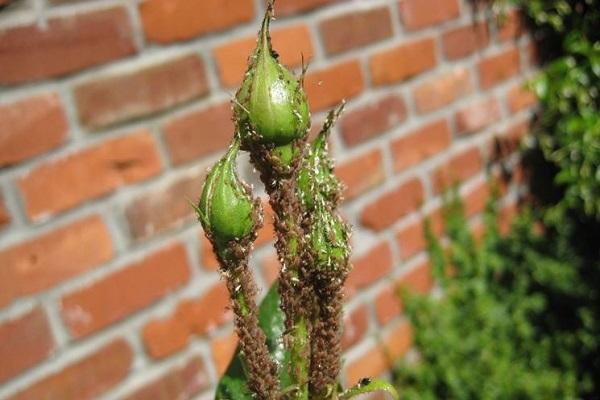
The same signs are observed in domestic roses when aphids are affected. At the initial stage, small white insects appear on indoor flowers. Later, their number increases, and larger green individuals appear.
Insect control methods
It is possible to eliminate the pest from the plant by a mechanical method or using chemicals and folk remedies. Aphids are helpless against the pressure of water. Therefore, first of all, insects should be washed off the rose. In the garden area, this can be done with a hose, and indoor flowers should be rinsed under running water from the tap.
This shower can be used to prevent infection. It is enough to wash the roses once a week.
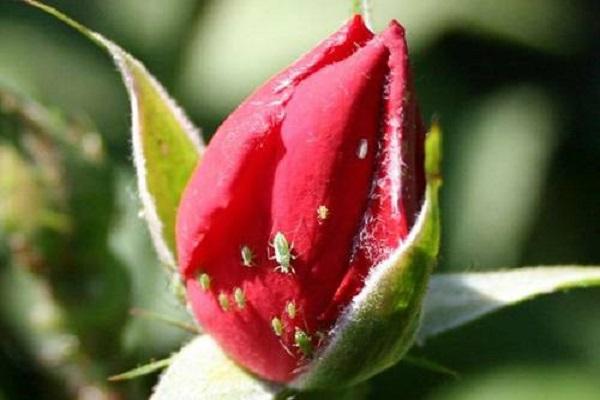
Aphid chemicals
It is better to remove single individuals on a flower manually, and then arrange water procedures for it. The use of chemicals is justified when the aphid colony grows. The choice of insecticides should be approached with extreme caution. The toxicity level of some products may be too high. At home, roses should be treated with drugs with a low hazard level (within 3 or 4).
Aktara
Contact action insecticide, available in powder form. One package of the drug is designed for 5 liters of water. When spraying, pay special attention to the inside of the foliage. Destroys the pest within 24 hours. The effect lasts for a month.
Bio spark
The active ingredients of the drug paralyze the insect. It can process both garden and indoor roses. Preparation of the solution involves dissolving 5 milliliters of insecticide in 1 liter of water.
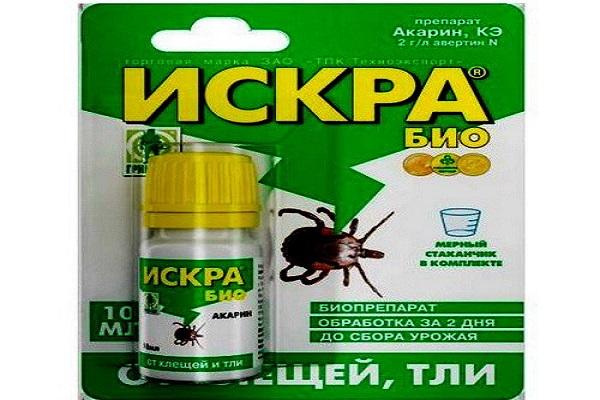
Karbofos
The drug copes well with aphids, but is toxic to humans. Therefore, rubber gloves and a mask should be worn during processing. To prepare the solution, you will need to dilute 75 grams of powder in 10 liters of water. The consumption of the prepared product is, on average, 0.5 liters per 1 bush.
Fitoverm
The basis of the preparation is the waste products of soil bacteria. Its action is not as fast as previous chemical insecticides. But, due to the biological basis, insects do not develop resistance to this poison. To spray roses, you need to dissolve 4 milliliters of the product in 1 liter of water.
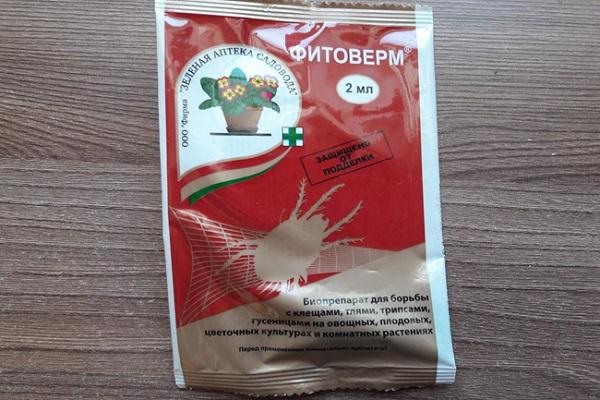
Inta-vir
The drug belongs to contact action insecticides. When in contact with a pest, it penetrates through its membrane and affects the nervous system, which causes paralysis. It is also effective in destroying aphid satellites - ants. Available in pill form. Preparing a solution for processing flowers involves dissolving 1 tablet in 1 glass of water. Then the resulting concentrate should be diluted in 10 liters of liquid. If the treatment is carried out during the flowering period, then the blossoming flowers and buds should be cut off beforehand.
These drugs belong to the third hazard class, therefore, during their use, rubber gloves, a mask or a respirator should be used to eliminate aphids on roses.
Folk remedies
Home remedies for combating rose green are no less effective. For the treatment of indoor roses, it is better to use self-prepared solutions, since they are harmless to humans.
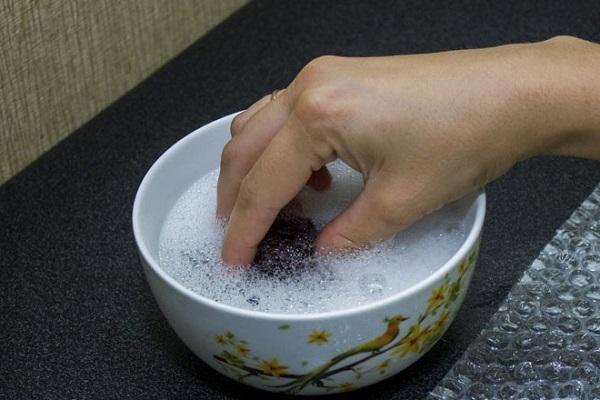
Soap solution
Grate 1 piece of laundry soap. Pour the shavings with water (1: 1) and stir until completely dissolved. Dilute 1 tablespoon of the resulting soap gruel in 1 liter of water.Spraying should be repeated daily until the aphids disappear completely (about 2 weeks).
Garlic infusion
Peel 100 grams of garlic, pour 3 liters of water. Leave for 3 hours, then strain and use as directed. Treatment of plants with such a solution is necessary once a week. The duration of treatment is 2 months.
Iodine + milk
Dilute 0.5 liters of milk in 5 liters of water. Add 20 drops of iodine to the resulting solution. Stir and process the roses thoroughly.
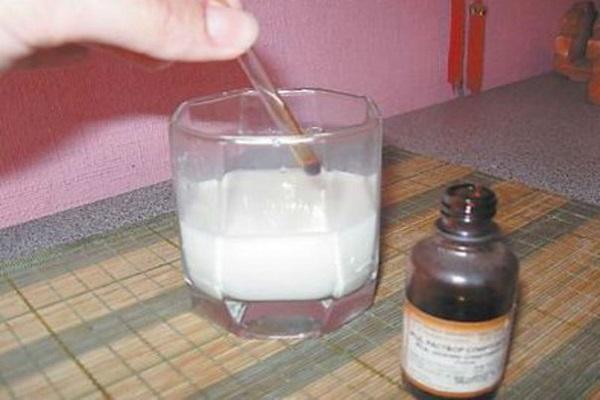
Coca cola use
Pour 1 bottle of soda (0.5 liters) into a bottle. Add 3 teaspoons of liquid soap. Shake the solution well. After the foam has settled, pour the product into a spray bottle.
Use of kerosene
Dissolve 2.5 milliliters of kerosene in 10 liters of water. Grate with laundry soap on a fine grater. You can use the solution when it acquires light stickiness. Spraying is done before flowering. After a day, the rose should be poured abundantly with a hose to wash off the remaining kerosene.
Ammonia
Plants are treated with a solution of 10 milliliters of ammonia dissolved in 10 liters of water once a week. The procedure should be repeated until the pests completely disappear.
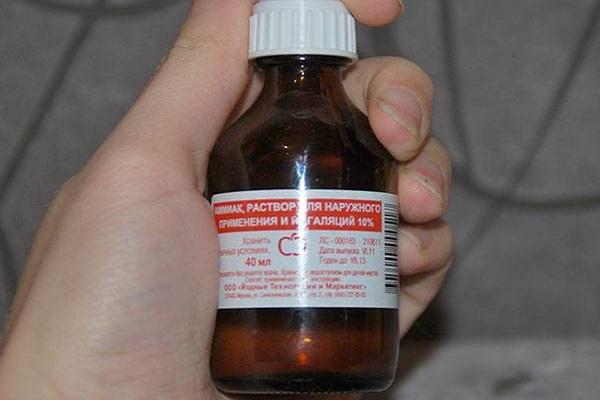
Citrus zest
Pour 300 grams of orange or lemon peels with 1 liter of boiling water. Insist 3 days. The product should only be applied to street roses.
Vinegar
Pour 200 milliliters of acid into 10 liters of warm water. With this tool, the bushes can be sprayed or watered from above from a watering can. Processing is carried out at intervals of 3 days for 2 weeks.
Important! When preparing the solution, the proportions should be strictly observed. A high concentration of acetic acid can burn young leaves and buds.
Serum
Whey is used undiluted in the fight against aphids on roses. The plant is watered from a watering can or thoroughly sprayed.
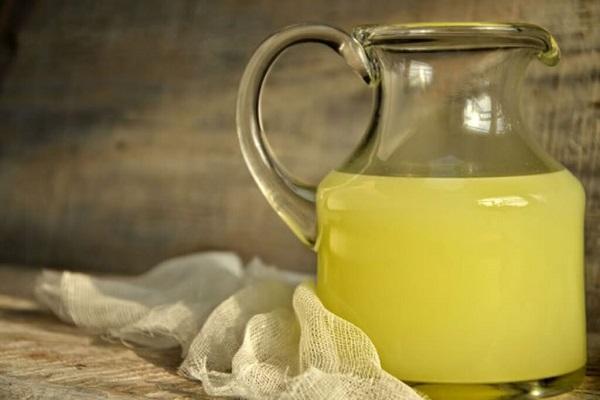
Copper sulfate
100 grams of the product is diluted in 10 liters of water. The solution can be used only once a month. It is also used as a fertilizer in the spring and as a prophylaxis.
Preventive actions
Preventing aphid infestation in roses is highly dependent on proper care. Timely pruning, regular weed control, and control over fertilizer concentration are key to plant health. But there are aspects that increase the chances of protecting flowers.
Purchase of seedlings
When choosing planting material, you should pay attention to varieties that are resistant to aphid attacks. These include:
- hybrid variety Leonardo da Vinci;
- polyanthus rose Fairy;
- hybrid tea grade Karina.
Their peculiarity lies in the dense structure of the leaves, which pests are not able to bite through.
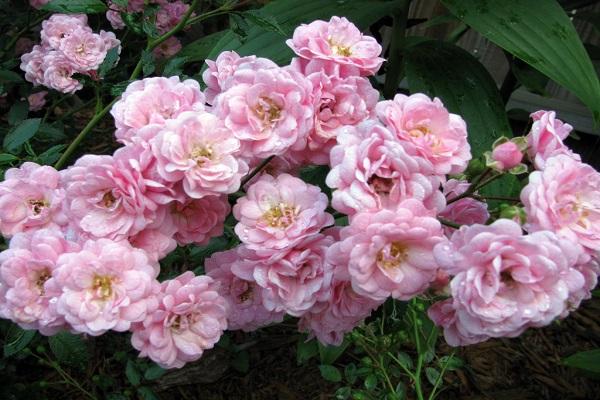
Neutralizing ants
Ants are the main pests in the garden. Therefore, control measures should be directed at them as well. Limiting the access of ants to the bush will help:
- tillage of the soil around the bush with semolina or millet;
- fencing the flower bed with sawdust soaked in lavender oil.
You can also kill ants using special chemicals.
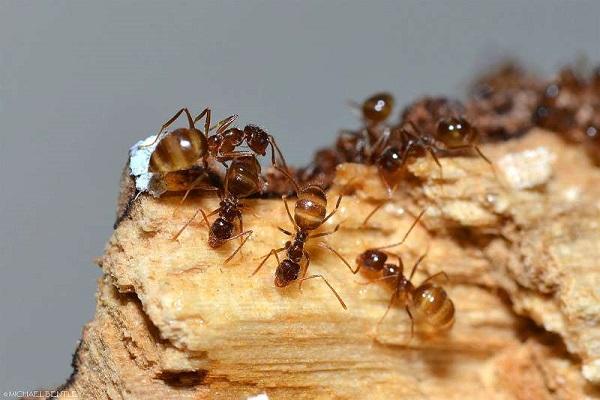
Using biological helpers
You can fight aphids, as well as prevent its appearance on roses, with the help of plants that have a specific smell. A flower bed with roses should be supplemented with marigolds, mint, sage, garlic or dill. The aroma of these crops repels pests.
Among insects, there are also representatives that actively destroy aphids. Ladybugs are considered the most useful in this matter. They are able to destroy entire colonies of pests.
A rose's health depends entirely on grooming. Attentive attitude to your pet will prevent the appearance of pests on it and reduce the risk of various diseases.
